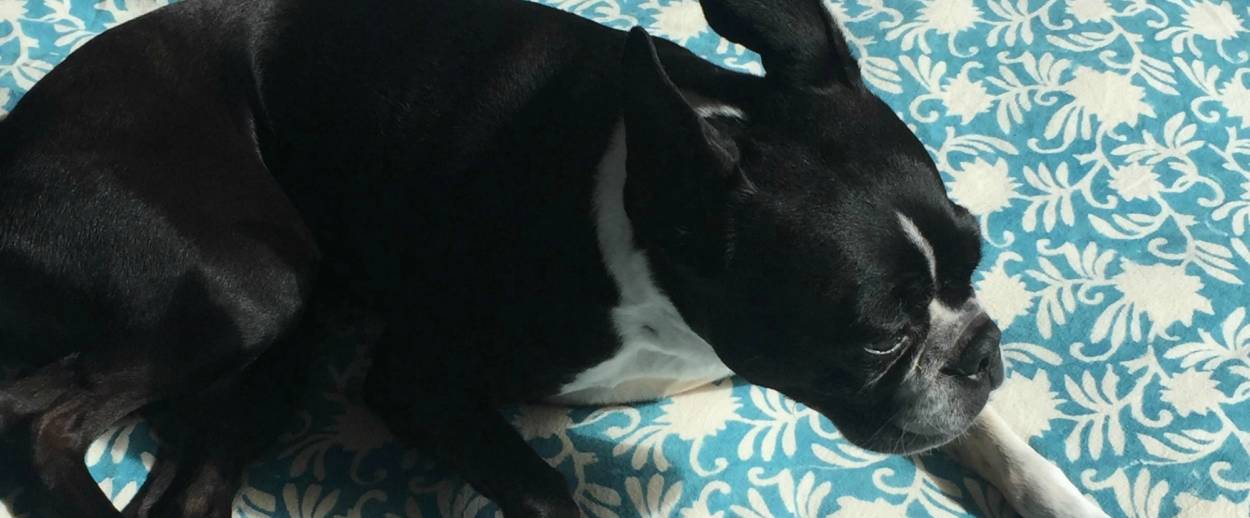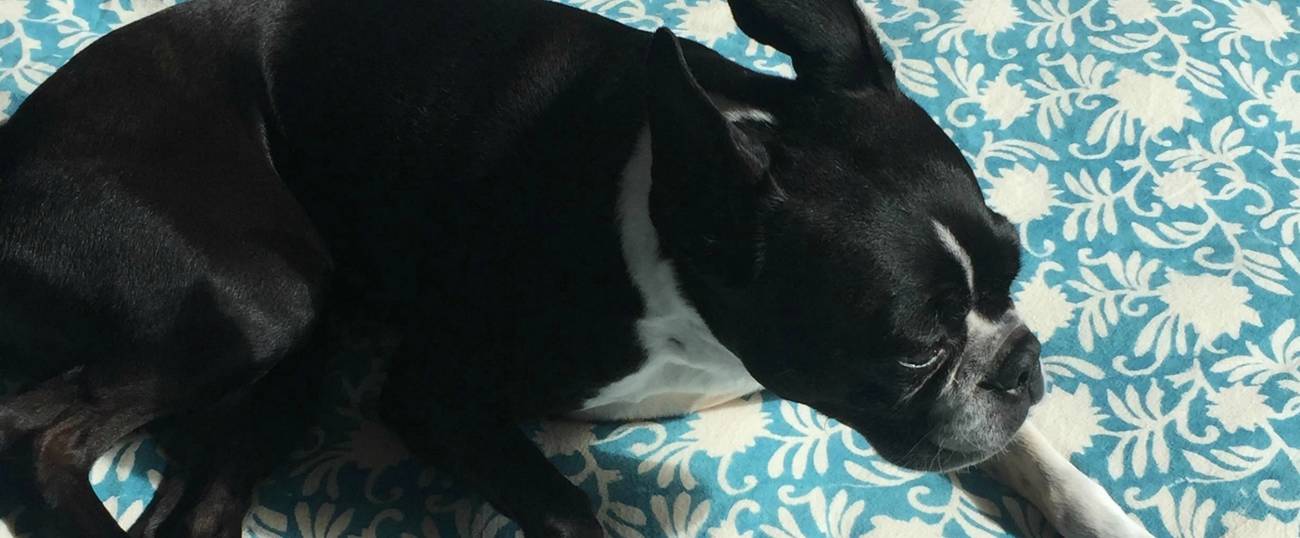In Losing a Dog, a Lesson in Love and Madness
Ours was never really the right home for Leo, but now that a medical emergency forced us to give him up, I realize just how happy he made our family




“He has to go back.”
Those were my husband’s words. It was eight years ago, and my son and I had only the week before flown home to New York from Mexico with our two-month old Boston terrier Leo. It hadn’t come as a complete surprise to us that we were about to become a family with a dog. Five years earlier, when we’d visited our friends in Cuernavaca, the kids had been charmed by their adorable new dog. “Someday,” our friend promised, “When the dog has babies, you can have one.” And sure enough we eventually received the phone call from our friend saying that if we wanted a new puppy, she had one picked out for us.
We’d decided in advance to name him Leo, because we knew that as a Boston terrier he would be anything but a lion in size, and as we soon came to find out, neither was he a lion in personality. In Cuernavaca, when my son and I finally laid eyes on Leo and his puppy siblings, all the others were cuddly and playful, our dog alone standoffish. “My dog hates me,” my son said, concerned about what might be ahead. “But he’s ours,” he continued. “We’ll love him.”
Once we’d flown all the way back to New York, Leo quivering the whole way in my son’s lap, my son comforting him, the unequivocal bonding had happened. He even waited the whole five-hour flight to pee, until my son spread out the newspaper for him next to the baggage claim at JFK.
Before we met Leo, the kids had argued about whose bed he’d sleep in. “Well, you know,” my husband had said, “the dog sleeps with the one who takes care of him, so maybe he’ll be sleeping with me!” The only non-natural-dog lover in the family, I countered, “He most certainly will not.” The kids then started vowing and boasting about how much each of them would walk the dog and feed him, and clean up after him. Truly, I couldn’t imagine my son or my daughter now verging on adolescence getting up early enough to take the dog out before school, or being around to walk and feed him. I worried to myself that my husband would be the chief caretaker.
It was March and still winter when we arrived with Leo on Riverside Drive, the freezing cold and windy climate a distant cry from his birthplace in sunny Mexico. My husband took him on his early morning and late night walks. And because I was the one who could manage to work from home those first few weeks, I was the one to take him out in the daytime. Leo shook more than ever, and I figured out that at least for a start it was best to hold his shivering body in my arms, rather than put him on a leash. I’d set him down on a spot he seemed to like, to pee and poop next to a tree in a little park across from our apartment building and then bring him inside again. In that first week, I hired a dog trainer, who immediately instructed me to sign Leo up for socialization classes, because clearly he was already maladjusted. I wondered whether Leo would ever learn to last more than two hours before having to go outside, if he would ever manage not to pee in the elevator, not to mention learn to get along with other dogs and be less fearful of people.
“It’s cruel to treat a dog like this,” my husband said at the end of that first week, “to keep him like this in a New York city apartment. We were irresponsible to have taken him. Don’t we know anyone who’s flying to Mexico, who can take him back?” In truth, our friends from Cuernavaca would be visiting New York that next week, but I wasn’t ready to imagine that my husband was really serious.
“We can’t just leave him alone all day,” my husband persisted rationally. “It’s just not fair to him.” In fact, the dog had not yet been left alone for more than the occasional hour, although I knew that down the road this would have to change. “What about all of the other dogs who stay alone all day in New York City apartments?” I reasoned. “Well, it’s not fair to them either,” he replied. “Then you’re the one who’s going to bring it up with the kids,” I said. It might be unfair to keep a dog in an apartment, but it had to be bad parenting to give the kids a dog and then take him away just as we were all falling in love with him. “Better to do it now than a month from now,” was my husband’s response. “Fine,” I told my husband, “you speak to them tonight, when I’m out.”
When I returned my husband had not told the kids. My son was still awake behind his closed door, and there was no putting off the inevitable. I went into his room to tell him that the dog would be happier in Mexico, where he wouldn’t have to be alone all day in an apartment. “Dad thinks it’s just not fair to the dog,” I said. “Dad’s wrong!” my son said back. “What does he think other New York dogs do? He’s not leaving. Close my door!” By now, my daughter was also awake, and she was crying, shaking almost as much as Leo.
The next night we had a meeting. We all gathered in the living room, my son and daughter on opposite ends of the chartreuse colored couch, me on the black leather one across the room. My husband stayed in the doorway, standing. I watched both kids hold back, as my husband officiated, saying how unfair it was to have a dog in New York City. My son started shouting. “Dad, we’re all helping out with Leo. Everyone except you!” “You have to let us keep the dog,” my daughter pleaded. “We love him just like other families love their dogs,” she said in tears. “You sound like you’re on some kind of tv show,” my son was now yelling at his sister. We’re keeping the dog, and that’s it!” They were both sobbing. “Okay,” I heard my husband say.
And so we kept Leo. He continued to be skittish, and developed additional eccentric habits, such as barking stridently at other dogs of all sizes, especially at large ones, and then crying and squealing when they barked back. When a stranger would approach us with a woeful look and ask, “Is that dog a rescue?” my husband would dryly respond, “No, we beat him. That’s what makes him the way he is.” Those two came to love each other, like no other dog and master, or maybe Leo was the master, it was hard to tell. My husband would scratch Leo’s belly, as Leo loved and demanded, and as only my husband could do. “Why can’t we have a cuddly dog?” my daughter would say, as she tried to balance him on her lap and he tried to escape. Only when my husband held him, did Leo seem at ease. He learned to jump as high as a circus animal, grabbing the cork out of my husband’s fingers when he opened the wine bottle. He sat by my husband’s side at the table, always ready to lick his plate, and suck on the bone from his meat.
Leo instantly rushed to welcome any of us the moment we crossed the threshold into the apartment. But it was my husband’s entrance that sent him running in endless circles. “He’s the perfect New York dog,” my husband would say. “He even hates going outside. And still, he gets plenty of exercise,” my husband would praise him. It was true, Leo ran regular laps, dashing back and forth across the kitchen for a good half hour a day, and longer on weekends, scratching his nails on the cork floor, as my husband repeatedly threw a tennis ball at top speed. And yes, Leo slept in our bed, continuing to instinctively quiver through the night, which my husband seemed not to notice. After more than eight years, Leo had become our own particular family dog in our own particular New York apartment.
And then, as life continued to have its turns of events, the news came that my husband had to have a major operation to help allay his cancer. It was a promising treatment but a lengthy one, and due to the compromised immunity it entailed, it meant we would no longer be able to have a dog, not one that slept in our bed, not for at least a year. It pained me to think of Leo without my husband, who seemed like he might be Leo’s sole soul mate. But my husband was also a rational being. The dog had to go.
My husband suggested that maybe our friends in Cuernavaca would want him back. But I knew they already had four dogs of their own to tend to, so sending him back to Mexico wouldn’t work. Maybe the porter of our building would take him for a while, like he had all the many times we’d gone on vacation. Or possibly a friend who appreciated Leo’s distinctive personality could provide a good home. “Is he good with children?” one friend asked us. “I’m taking him!” my daughter said, but they wouldn’t allow dogs in her college dorm.
The family of a friend of my daughter’s, who had recently taken Leo for the weekend while we were traveling, loved him. They had brought him to their house by a lake, and reported that Leo actually loved swimming, and that he’d even befriended the Golden Retriever next door, or so the story went. They’d be thrilled to have Leo stay with them indefinitely, they told us. And so, although it was strange and painful to let him go, an incomplete solution, we really did say goodbye to Leo.
In the final assessment, my husband was right—it was irrational to have a dog in a New York City apartment. Now that Leo is no longer here, I don’t miss the times when I’d find a small pool of throw-up on our bed after my husband had left too much raw meat on the bone that he’d given him to gnaw. Or the times when I’d be on the phone, on a business conversation, when Leo would suddenly rise from his long nap and start barking raucously until I would throw him the ball, something I’d then have to manipulate through the entire phone call. But it was also the irrational that made us love him, the way he unpredictably brought us together even while we were arguing about his very presence. Every morning when I finish my bowl of fruit and yogurt, my first instinct is still to put the bowl on the floor, so that Leo will come to lick the remains. I don’t know if I’ll ever have a dog again, but I know I’ll never stop missing Leo’s manic, demanding, and absolutely adorable personality, or the irrational, unpredictable ways he made me, and all of us, happy.